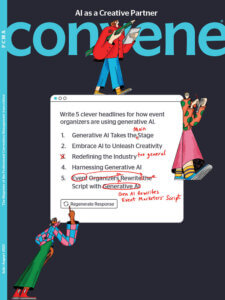
AI is rapidly transforming the events industry, with event planners using AI to automate tasks, improve efficiency, and generative AI to create marketing and session description copy. (Sergio Membrillas illustration)

Joe Colangelo, founder of Bear Analytics
Currently, we’re seeing AI change the way that long-standing organizer challenges around data collection and analysis are being tackled. Here are just a few of the real cases AI supports today for data management, marketing support, and sales growth:
Data cleaning — Gone are the days of hand sorting hundreds of open-field job titles and parsing them into five or six standardized job roles. AI is empowering planners to do this in seconds — work that used to take a month for interns to do. Not only do AI tools save time, but they also bring more robust, highly contextualized data to planners’ fingertips.
Answer engine — There are few event teams or associations fortunate enough to have data analysts dedicated to optimizing marketing and sales for growth. Now everyone across every team has access to instant insights, powered by the human language. Want to understand what marketing codes performed this week? A profile of which exhibitors are downgrading? To understand which areas of the show floor are more popular than others for various attendee badges? AI can power those answers — faster than ever before.

Part of our July/August cover and CMP Series. (Sergio Membrillas illustration)
Complex correlations — The problem with charts and tables has always been the number of permutations required for a person to derive answers from. With a properly trained AI model, event planners can understand which audience segments are more responsive to various marketing campaign elements — without having to write one formula or even look at a chart.
And we’re just getting started. Imagine a future where AI is enabling attendees to discover and personalize event content and experiences as they are participating in that experience. What about a future where sponsorships and exhibit return on investment becomes a pre-event formula that estimates their return on experience — before the experience? This type of analytical power will fundamentally change pricing models, bundling, and the fabric of how business gets done for events.
Joe Colangelo is founder of event data company Bear Analytics.
